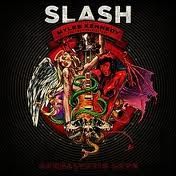Originally published on June 19th 2012. 
L.S. Media Rating ****
Unlike Slash’s debut self-titled 2010 album, Apocalyptic Love has more gravitas as a collection of songs, it is cohesive and the songs seem somehow to flow better into one another. The reason perhaps is unlike Slash, the album profits from having a stable line-up all the way through. It makes the album have more appeal than believing for a minute that the debut album was an exercise in self-indulgence.
Whereas Guns and Roses, the band where Slash made his name in the world of guitar driven rock, have gone down-hill in a lot of fans eyes; in huge part to the antics of their lead singer at gigs, especially where he has kept audiences waiting for hours before appearing on stage, Slash has quietly gone about his business and kept playing and delivering songs that on the whole stand out.
From Slash’s Snakepit, via Velvet Revolver, to this new and powerful album, Slash’s guitar stamp is all over the record. Whereas Slash used the combined talents of Izzy Stradlin, Taylor Hawkins, Steve Adler and a multitude of others to get the sound across, Apocalyptic Love shows what can be achieved when you have three musicians by your side, playing note for note and delivering the songs with style and a fair amount of aggression and not bogged down by separate destructive egos.
Slash’s band consists of Myles Kennedy, Todd Kerns and Brent Fitz or otherwise collectively known as Myles Kennedy and the Conspirators, they have gelled over the last couple of years to make a rock album that no doubt will sell in its millions, possibly because of Slash’s reputation amongst his fans but it would be hoped because of the songs themselves. Stand out songs such as Standing In The Sun, You’re A Lie and Anastasia show Slash and the band at their very determined and collective best.
If Slash can keep producing albums of this quality and move his other band from the Guns and Roses/Velvet Revolver hybrid that has followed them around like a bad smell then there is hope that some of the past can be seen for what it was, a mere stepping stone for better times.
Ian D. Hall
